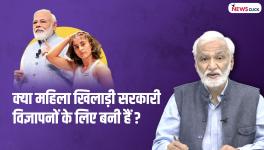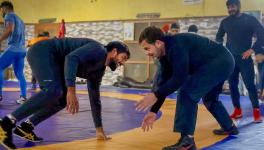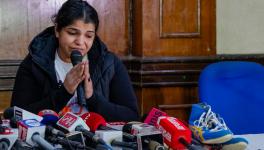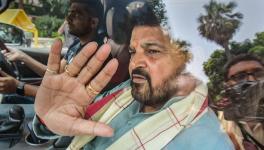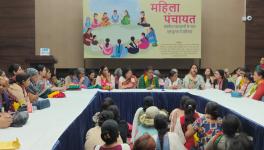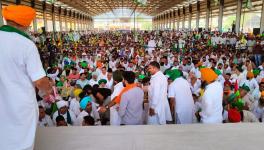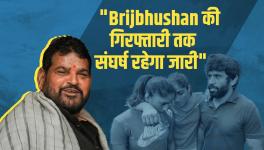New Year, New Rules: Wrestling Takes the Plunge, to Hold Nationals But With Glaring Oversights
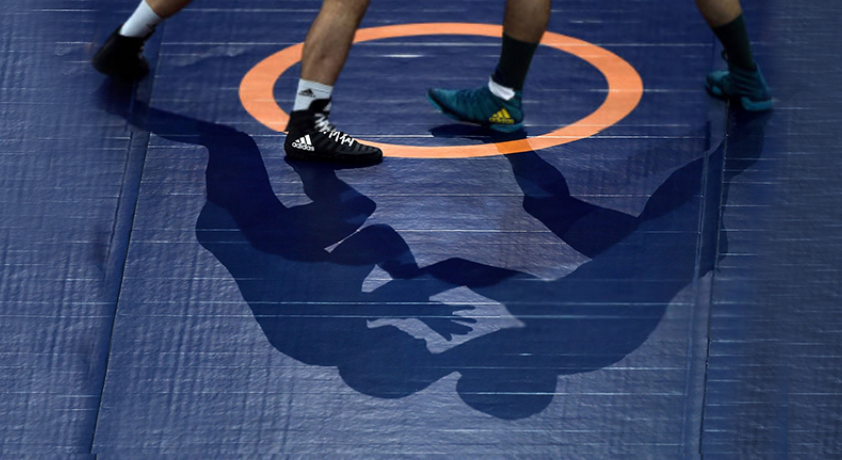
The Indian wrestling establishment is confident about its protocols for the national championships and is also expecting the state units — the ones that will travel to compete — and the athletes themselves to be responsible about keeping safe (Pic: Wrestling.tv).
2021. The year for sport begins with hope that the coming months will see a resumption of competitions in India. We are talking not just the elite leagues in bubbles, but competitions ranging from the grassroots to the national championships in all disciplines. It has to restart at some point, is the prevalent feeling that cuts across all levels — athletes to organisers and the administrators. And, wrestling — a contact sport which one would imagine will have trouble getting staged during Covid-19 — is leading the way in India.
It had to happen at some point, of course, and while major Olympic disciplines ranging from athletics, shooting and table tennis have been reluctant to take the plunge, wrestling has ventured in, knowing the risks involved. The Wrestling Federation of India (WFI) will hold the senior men’s freestyle championship in Noida from January 23 and 24. The women’s tournament will be held in Agra a week later (January 30 and 31) while the men’s Greco-Roman is slated for February in Punjab. The separation in segments is to ensure the affairs remain small, and the number of athletes converging doesn’t require specialized crowd management. Believe me, wrestling in the NCR at times needs crowd management. The organisers are keen on establishing fail-proof physical distancing protocols at all three venues.
The risks involved are manifold for the wrestling nationals. To start with, the tests — RT PCR is the prescribed one — while definitely more reliable than the Rapid Antigen one, is still not fail proof. False negatives and positives do happen, and the accuracy or lack of it is dependent on the duration after which a person is tested post exposure. The WFI’s safety protocol hinges around the RT PCR test — a single one that too.
Also Read | The 2020 Yearender: Learning to Write on Sport Again, And Refusing to Accept a New Normal
Secondly, the nature of wrestling — from the mat to how the athletes train and compete — poses its own challenges. Then, of course, is the biggest variable — domestic travel. Most state teams travel in trains for the nationals, and the long distances involved translate to increased potential for getting infected.
The wrestling establishment is confident about its protocols and is also expecting the state units — the ones that will travel to compete — and the athletes themselves to be responsible about keeping safe. Not sure if the WFI has its fingers crossed for this one. If not, it should!
“That’s the reason why we have set our own protocols based on the directives from the Sports Ministry and the model that was implemented during the UWW (United World Wrestling) World Cup in Serbia last month,” says VN Prasood, secretary general of the WFI.
There are two distinct templates to organising sport under the shadow of the coronavirus. The first involves getting everyone into a biosecure bubble like how the Indian Premier League (IPL), the ongoing Indian Super League, the upcoming I-League, and the tennis Grand Slams were organised. It is an expensive proposition, one that was not implemented by the IFA Shield organisers while staging the historic tournament in Kolkata last month.
The second template involves testing while coming in for competition, and then monitoring of vitals such as body temperature through the course, while other safety protocols such as physical distancing, wearing of masks, training in seclusion, and disinfection of equipment etc are implemented. The players themselves will be put up and operating in and around a secure environment but not exactly a bubble. This was implemented at the UWW World Cup, and certain badminton and table tennis tournaments in Europe.
Also Read | Made and Minted in I-League, Behold the Young Indian Stars of ISL
But even here, tests results and their inaccuracy can throw a spanner in the works at any time. An example is the SaarLorLux Open in Germany last year, where Lakshya Sen, Ajay Jayaram and Shubhankar Dey were forced to quit after what later became apparent was a false positive test result.
Wrestling, understandably since it’s easier on the pocket, is going for the second template. But with a slight, yet significant, tweak.
At the tournaments mentioned above, the athletes, while arriving in the country of competition or the venue, were required to carry a negative RT-PCR test report and certificate from the home country. Post that, he or she had to clear another test before being allowed entry into the tournament green zone. Then, the other protocols took over.
At the wrestling nationals, the athletes and officials of the teams should come in with a negative report of a test done not later than three days (72 hours) from the date of arrival. Post that, there won’t be any testing. Also, the athletes are expected to arrive a day or two max before the two-day competition and not earlier. Similar template is being used by the state units while organising their trials for the nationals, reveals Prasood. That includes his home state Kerala as well where the trials would be held on January 6.
“The last date for the states to give entry for the men’s nationals is mid January,” says Prasood. “And, in Kerala, the same process would be replicated. The wrestlers have to come in with a negative report from tests done within 72 hours of the competition. The mats would be sanitized after every bout. The tournament would be conducted using bare minimal officials and support staff required to run the show. They will all have to also come in with a negative test report. And we are going by RT-PCR for that is the gold standard. Everyone except the wrestlers who are fighting on the mat would be required to wear masks at all times.”
Also Read | Swansea City to Investigate Booing As Players Took a Knee
It is heartening to see the wrestling establishment working hard to ensure the smooth and safe conduct of its championships. However, the testing protocol seems inadequate. For state teams coming from down south such as Kerala, the travel duration in normal circumstances drains out athletes. It magnifies manifolds now since they would barely get a day to recover. But that’s not the concern here. The big worry is the pandemic. A long train journey is tricky as it opens up people to potential exposure. Prasood clarifies that the athletes, who will be taking the tests on their own (the state body doesn’t have the resources to do it and there is no coaching camp organised either), will get the test done before they board. And since the train reaches Delhi NCR in a little over two days, there is enough time for the result to come in within the time frame prescribed by the federation in the protocol.
So a test taken prior to what is a nearly a 3,000 km train journey would give wrestlers access to the national championships. No tests thereafter, just basic temperature checks. Has the federation ignored the potential of infection during the journey? And we are not just talking about long distance ones, but also shorter journeys within states of north India. With the UK Covid-19 strain, which is a super spreader, already in the country, the situation could get trickier by the time the wrestling nationals come around.
The WFI is optimistic. “Trains are less crowded these days. Almost empty. Besides, we are talking about the senior team. They are adults, They are expected to act responsibly and take measures. Directives will be given to all the teams and all wrestlers prior to travel. They have to stick to that. The rest, well, I would be lying if I say there is no risk involved. But the tournament is important for Indian wrestling too, especially for the upcoming ones.”
Of course, the importance of staging this tournament is not even the question here. The question here is the protocol and what seems to be an oversight. The WFI seems to have not taken into account the nature of a coronavirus infection and how it pans out, including the gestation period, which varies from two days to 14. Exactly why a quarantine period of 14 days is prescribed for all travellers. That’s exactly why sports biosecure bubbles also earmark at least a week’s quarantine and mandatory two to three negative test results before deeming the athlete fit for competition. The WFI seems to believe that a short tournament means less risk.
And as far as the dependency on the RT PCR test is concerned, there are studies which have averred that false negatives are higher in the first three days of exposure.
Harvard Health cites in a report studies which state that the false negative rate was 20% when testing was performed five days after exposure or when symptoms began, but was much higher (up to 100%) earlier in infection. So, the effectiveness of a 72-hour window for testing is questionable, and so is the belief that chances of infection are negligible during a two-day train journey across the length of the country.
The cumulative oversights of the WFI could spell disaster. But it is January 1, 2021. So one is hopeful that such scenarios won’t arise and wrestling prevails.
The men’s championship could also have a star attraction in the mix — Narsingh Yadav returning after a four-year doping ban. The 74kg competition then becomes quite exciting. A slot for the Olympic qualifiers is up for grabs there and Narsingh would be keen to prove a point. But his fortunes hinge on a test once again. For the last Olympics it was a dope test. Now it is a RT-PCR test.
Get the latest reports & analysis with people's perspective on Protests, movements & deep analytical videos, discussions of the current affairs in your Telegram app. Subscribe to NewsClick's Telegram channel & get Real-Time updates on stories, as they get published on our website.










